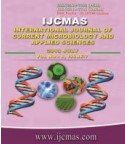


 National Academy of Agricultural Sciences (NAAS)
National Academy of Agricultural Sciences (NAAS)

|
PRINT ISSN : 2319-7692
Online ISSN : 2319-7706 Issues : 12 per year Publisher : Excellent Publishers Email : editorijcmas@gmail.com / submit@ijcmas.com Editor-in-chief: Dr.M.Prakash Index Copernicus ICV 2018: 95.39 NAAS RATING 2020: 5.38 |
Vegetables play important role in supply of vitamins minerals and fibers. Micronutrient demonstrations conducted by KVK, Koppal emphasized on sustainable production of vegetables with higher yield which ultimately improves the economy and better livelihood of the vegetable grower. The present demonstrations were carried out in 9 different vegetables of Solanaceous, cruciferous and cucurbitaceous-s family during 2016-17, 2017-18 and 2018-19 respectively. The yield related parameters like number of fruits/plant (No.), Average fruits weight (g), Average head/curd weight (Kg), crop duration (No.) etc. were recorded. In relation to this net return (Rs), extension gap (t/ha), Technology gap (t/ha) etc. were also calculated. When average number of fruits per plant was calculated it was recorded 25 fruits/plant, 17.5 fruits/plant and 27.5 fruits/plant in Tomato, Chilli and Brinjal respectively. The other yield related parameters were also recorded in increasing trend. The net returns of all the nine vegetables were recorded on higher side because of higher productivity and good market price viz., Tomato (193771 Rs/ha), Chilli (485280 Rs/ha) Cauliflower (168500 Rs/ha) etc. When we studied the productivity difference, Extension gap, technology gap and technology index, there was increased productivity was observed over farmers practice and reduces extension gap and technology gap was recoded that could be due to variation in the soil fertility, varied climatic conditions, GMP followed by the farmers and also higher rated technology adoption. The present technology was very much feasible based on the lower technology index recorded in all nine different vegetables taken up in the study.
 |
 |
 |
 |
 |